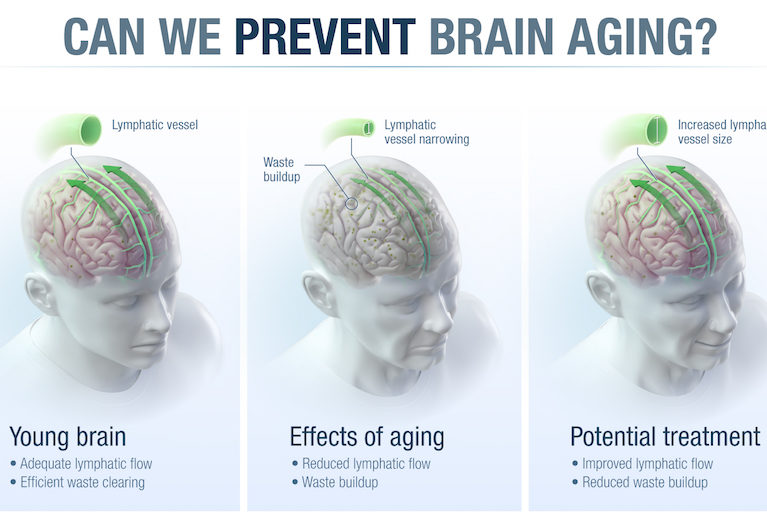Excess weight may accelerate brain aging
- Obesity and overweight increase the risk of many health conditions.
- A new study from Canada has found that excess body weight may also affect cognitive function, with inflammation possibly playing a role.
- People with excess fatty tissue gained lower scores for processing speed in cognitive tests.
- Physical exercise, which increases blood flow to the brain, may help limit cognitive impairment even in those with a high body mass index (BMI).
It is widely known that excess body weight is associated with many health conditions. Now, researchers have found an association between adiposity — having too much fatty tissue in the body — and cognitive impairment.
At the start of a new study, which appears in JAMA Network Open, Canadian researchers determined the adiposity of more than 9,000 participants. They measured both total body fat and visceral adipose tissue (VAT) — the fat that predominantly sits around organs in the abdominal cavity.
Previous studies have associated VAT, or visceral fat, with increased morbidity and a higher mortality risk. Visceral fat increases the risk of many conditions, such as:
- heart disease, including heart attacks
- type 2 diabetes
- raised blood pressure
- stroke
- breast and colorectal cancer
- Alzheimer’s disease
This latest study suggests that excess fat may have mental as well as physical effects.
Cognitive tests
All participants undertook two cognitive tests — the Digital Symbol Substitution Test (DSST) and the Montreal Cognitive Assessment (MoCA) — to assess a range of cognitive functions.
The researchers adjusted the scores for cardiovascular risk factors, educational level, and MRI-detected vascular brain injury, which is known to be associated with cognitive impairment.
The researchers found that higher total body fat and higher VAT were both significantly associated with lower DSST and MoCA scores. The association was greater on the DSST, which assesses processing speed, than on the MoCA, which is a multidimensional cognitive test.
Compared with those in the lowest quartile (25%) of adiposity, the performance of those in the highest quartile was equivalent to an additional 3 years of cognitive aging.
These results are not unexpected, as Dr. Anton Porsteinsson, professor and director of the Alzheimer’s Disease Care, Research and Education Program (AD-CARE) at the University of Rochester Medical Center, told Medical News Today:
“It is well-known that greater adiposity and body fat are associated with increased cardiovascular risk factors and that those are associated with increased risk of cognitive decline. This cross-sectional study found that excess adiposity was a risk factor for reduced cognitive scores, independent of cardiovascular risk factors, educational level, and MRI-detected vascular brain injury.”
This study reinforces findings from a previous study of older adults in Dublin, which found an association between adiposity, particularly central adiposity, and reduced cognitive function.
Possible causes
This study cannot prove a causative link between adiposity and cognitive impairment, as Dr. Eamon Laird, a senior research fellow at Trinity College Dublin in Ireland.
“It is cross-sectional, and it can be hard to tease out the associations and identify if visceral adiposity is causative and not just correlated with reduced cognitive scores. But the association is clear.”
The researchers controlled for cardiovascular risk and vascular brain injury, both of which research has shown to cause cognitive impairment. So, what else might be responsible for the link?
Effect of inflammation
The authors suggest that inflammation may play a role in cognitive impairment in those with overweight or obesity. One recent study involving more than 15,000 individuals found high levels of plasma C-reactive protein, an inflammatory marker, in those with a high BMI and a high waist-hip ratio.
Dr. Porsteinsson agreed with this suggestion, saying, “Systemic inflammation and glucose intolerance emerge as lead suspects.”
Dr. Laird also supports inflammation having a role. He said, “Pro-inflammatory cytokines from adipose tissue could also potentially be contributing to tissue damage via inflammation.”
Hypertension and reduced blood flow
There are also other potential mechanisms. For example, “Adiposity can often go hand in hand with other chronic conditions, such as hypertension, which could be a separate mechanism,” Dr. Laird told MNT.
“Obesity could be associated with reduced blood flow to the brain, which may increase the risk of vascular microcellular damage, which could lead to [a] reduction in cognitive test score,” he added. In another study, which Dr. Laird co-authored, scientists found that a 1-centimeter increase in waist size gave the same reduction in blood flow as 1 year of aging.
Combating cognitive decline
This study confirms previous findings that overweight and obesity are associated with cognitive impairment, so what can people do to help combat this?
Dr. Porsteinsson suggested several measures that may help: “Weight loss, exercise (both aerobic and resistance training), control of diabetes/glucose intolerance, or speed of processing cognitive training are a few that come to mind.”
Citing study findings that those with a high BMI or high waist-hip ratio who did little physical activity had significantly lower cerebral blood flow, Dr. Laird added:
“Since physical activity could potentially moderate obesity/blood flow associations, this [increasing physical activity] may be a cost effective and relatively easy way to help mitigate the negative impact of obesity.”
“There are still many unanswered questions here, such as why a task of processing speed (DSST) is more impacted than a multidimensional cognitive test, so this study begs for further research.”
– Dr. Anton Porsteinsson
In summary, maintaining a moderate weight could benefit the brain as well as the body.

